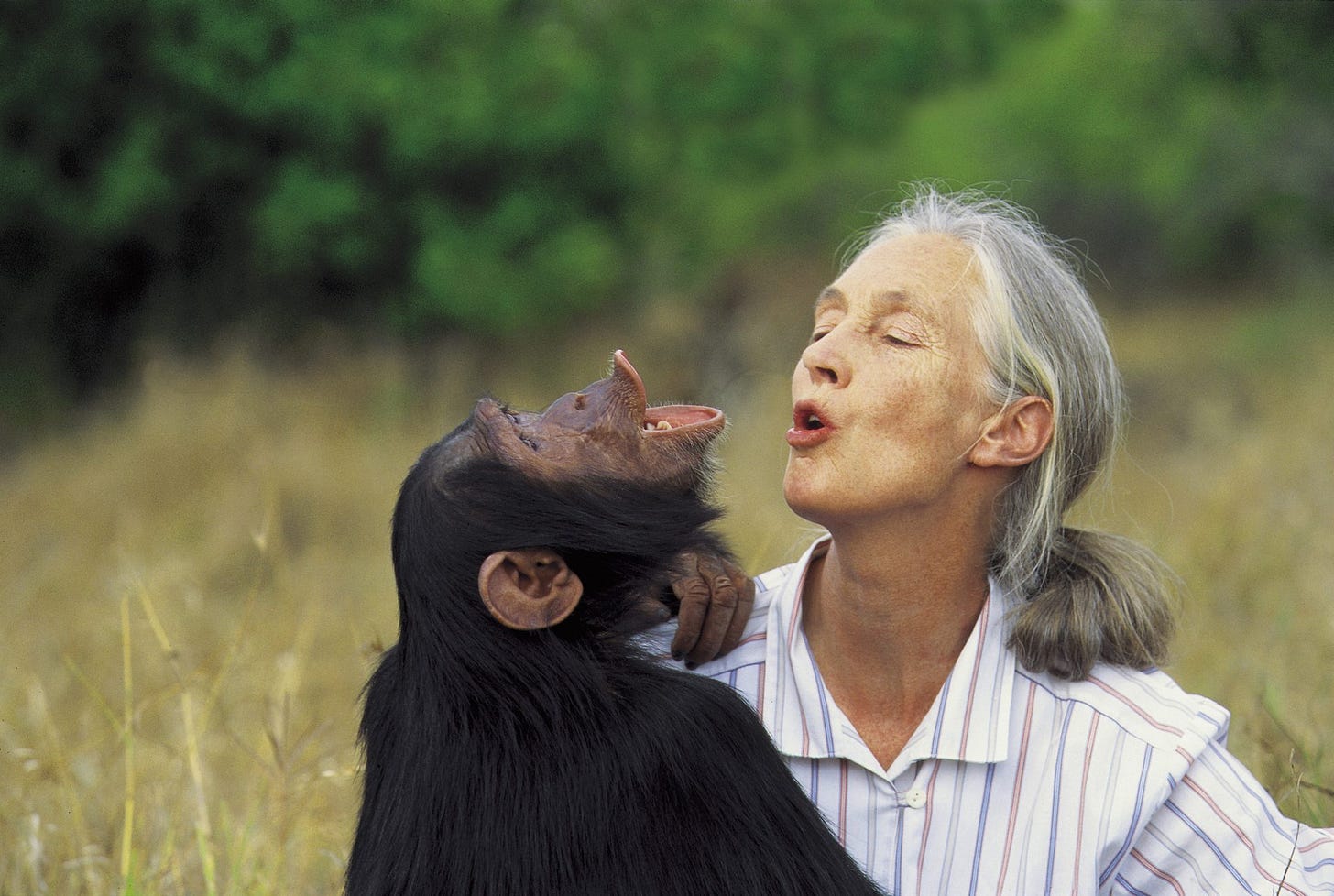A Giant Departs, a Vision Remains...
Why Jane Goodall’s Work Changes Everything?
The news of Dame Jane Goodall’s passing hit me with a profound sense of loss, yet also an overwhelming appreciation for her monumental life. At 91, she left this world, but the mirror she held up to humanity—reflecting both our shared lineage with the animal kingdom and our urgent responsibilities—remains. Her work wasn’t just about chimpanzees; it was a radical redefinition of what it means to be human. In this piece, I want to explore how her discoveries confront our deepest assumptions and why her message of interconnectedness is more vital now than ever for you and me.
The Big Question: Are We Truly Apart, Or Deeply Connected?
It’s easy to feel like we’re separate from nature, isn’t it? We live in cities, stare at screens, and often see the “natural world” as something outside our daily lives, something to visit or protect from a distance. For a long time, science itself reinforced this idea, drawing sharp lines between humanity and everything else. But Jane Goodall, in her quiet, persistent way, utterly dismantled that illusion. Her life’s work forces us to ask: If our closest animal relatives are so much like us, where does that leave our cherished notion of human exceptionalism? And what does that mean for our moral compass and the very survival of our planet?
I find this question incredibly urgent, almost apocalyptic, because it cuts to the core of our collective denial. It highlights a universal human weakness: our comfort in believing we are special, exempt from the rules that govern the rest of life. Goodall’s insights demand that we shake off this comfort and confront the existential stakes of our shared existence.
Jane Goodall’s Radical Empathy: What She Showed Us About Ourselves
Imagine being a young woman, going into the Tanzanian jungle in the 1960s, with little formal training but an abundance of curiosity and patience. That was Jane Goodall. What she found there wasn’t just interesting; it was revolutionary. She saw chimpanzees making and using tools – a trait previously thought to define humanity. This wasn’t just a fun fact; it was a profound blow to our self-image as the sole “tool-makers.”
But her observations went even deeper. She witnessed chimps forming strong, individual personalities, engaging in complex social politics, and displaying powerful emotions like joy, fear, and even profound grief after the loss of a loved one. As she famously said:
The more we learn about the amazing world of the chimpanzees, the more we realize how like us they are. And the more we realize how like us they are, the more we want to protect them.
– Jane Goodall
This wasn’t just science; it was a recognition, a mirror effect. She wasn’t just studying animals; she was helping us understand ourselves through them, forcing us to acknowledge that the capacity for deep emotion and intellect wasn’t exclusively ours. Her approach, deeply empathetic and observational, redefined primatology and set a new standard for connecting with the natural world.
The Urgent Call: Why Her Discoveries Are Our Crisis Today
Goodall’s work isn’t just a historical footnote; it’s a living prophecy. Her discoveries about our biological kinship with chimpanzees provided the intellectual depth needed to fuel the environmental movement. If we share so much with these incredible creatures, how can we justify their destruction, or the destruction of their habitats?
Her later life, spent tirelessly warning about climate change and biodiversity loss, lent an apocalyptic urgency to her message. She saw the direct link between our illusion of separation and the impending collapse of ecosystems. It’s no longer an abstract concern; it’s an existential threat to our collective future. We are facing a crisis of moral decay, a danger born from our addiction to comfort and denial.
Every individual makes a difference. And we have a choice as to what kind of a difference we are going to make.
– Jane Goodall
This quote, simple yet profound, encapsulates the timely and timeless connection of her work. It’s not just for scientists; it’s for every one of us, right now, today.
Go Deeper
Step beyond the surface. Unlock The Third Citizen’s full library of deep guides and frameworks — now with 10% off the annual plan for new members.
Living Goodall’s Legacy: How You Can Make a Difference
So, what do we do with this profound legacy? For me, applying Goodall’s wisdom starts with a fundamental shift in perspective. It means recognizing that we are not separate from nature, but an intrinsic part of it. It means understanding that actions we take, even small ones, have ripple effects across the interconnected web of life.
You can start by simply observing the natural world around you with new eyes, fostering empathy for creatures great and small. Support organizations that champion conservation and ethical treatment of animals, like her own Jane Goodall Institute or Roots & Shoots. Challenge the narratives that promote endless consumption and exploitation. Most importantly, embrace the idea that your individual choices matter. Jane Goodall taught us that the illusion of human exceptionalism is a dangerous comfort, and our collective survival depends on shedding it. Let’s honor her by becoming active stewards of this planet, for ourselves, for all life, and for generations to come. Her passing is a reminder that the work is far from over, and it falls to us to pick up her torch.




A Superhero for Earth!